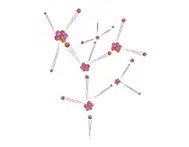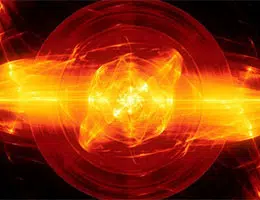 The term fission , which derives from the Latin word fissio , has several uses. The first meaning mentioned by the Royal Spanish Academy ( RAE ) in its dictionary refers to a breakup , a secession or a division .
The term fission , which derives from the Latin word fissio , has several uses. The first meaning mentioned by the Royal Spanish Academy ( RAE ) in its dictionary refers to a breakup , a secession or a division .
In the field of biology , fission is the division of a cell that occurs when, after strangulation, different fragments of protoplasm (the substance that contains the cell nucleus and cytoplasm) are separated.
Binary fission is a method of asexual reproduction shared by certain yeasts, algae, bacteria and other organisms. In this process, first the deoxyribonucleic acid ( DNA ) is duplicated. Then cytonesis occurs, which involves the separation of the cytoplasm. In this way, through binary fission, two daughter cells arise.
In the field of physics , nuclear fission occurs when the nucleus of an atom breaks apart from a bombardment of neutrons . This phenomenon generates a great release of energy .
Fission involves the nucleus splitting into two or even more smaller nuclei, as well as byproducts such as photons, free neutrons, and others. As it is an exothermic process, energy is released as kinetic energy and as gamma radiation.
It is important to note that nuclear fission can cause a chain reaction since the neutrons that are launched as byproducts can impact other nuclei and cause new fissions.
We should not confuse this concept with nuclear fusion , the process that results in the union of various atomic nuclei with similar charges to form one of greater weight. At the same time that this phenomenon occurs, a large volume of energy is absorbed or released, thanks to which the matter enters a plasmatic state (which resembles a gaseous state, although with some ionized particles that are not balanced).
Nuclear fission is the basis of nuclear bombs or atomic bombs , whose destructive power is given by the energy released by the chain reaction they generate. These bombs are weapons of mass destruction: the only country to use such a weapon against civilians was the United States in 1945 , when it attacked the Japanese cities of Hiroshima and Nagasaki , causing hundreds of thousands of deaths.
 It all began in 1938, when Fritz Strassmann and Otto Hahn , two chemists and researchers of German origin, discovered nuclear fission taking advantage of the findings of a work that Hahn had carried out with the Austrian physicist Lise Meitner . It should be noted that this discovery earned Hahn the Nobel Prize in chemistry in 1944, as it is an important part of nuclear physics and chemistry .
It all began in 1938, when Fritz Strassmann and Otto Hahn , two chemists and researchers of German origin, discovered nuclear fission taking advantage of the findings of a work that Hahn had carried out with the Austrian physicist Lise Meitner . It should be noted that this discovery earned Hahn the Nobel Prize in chemistry in 1944, as it is an important part of nuclear physics and chemistry .
Although we could say that fission takes place when radioactive matter decays and that it usually begins in the easiest way possible, through induction by the absorption of a free neutron, it is also possible to launch other components towards the fissionable nucleus to induce this phenomenon . Things that can be used in bombardment include high-energy photons, nuclei, and protons.
Although it is not common for it to happen, nuclear fission of a fissionable nucleus can occur spontaneously, without a neutron entering. Another interesting fact is that the weight of the element is directly proportional to the ease of induction.
For any element that weighs more than iron, fission generates energy, while for lighter elements it is necessary to provide energy. In a nuclear fusion reaction , precisely the opposite occurs.
